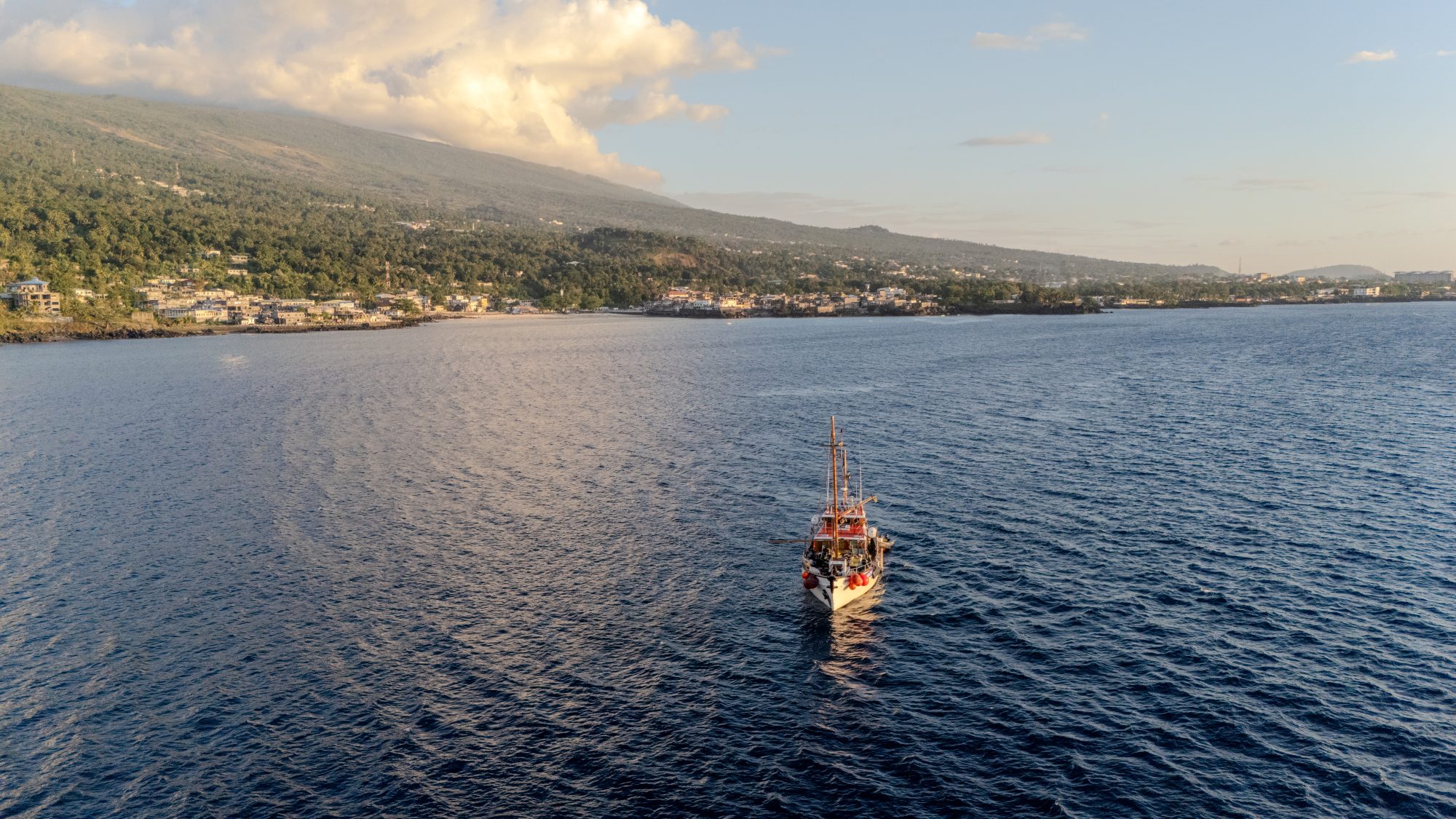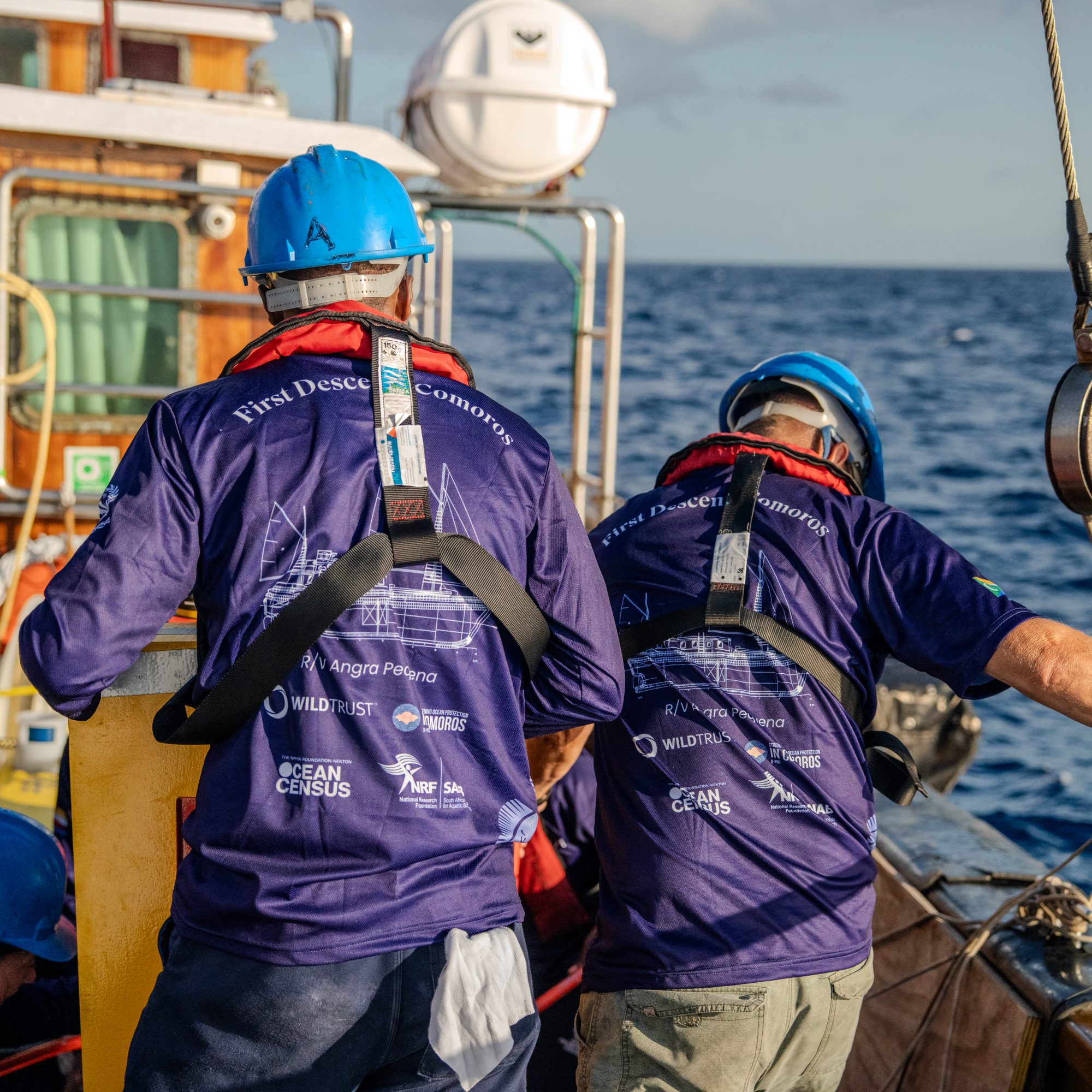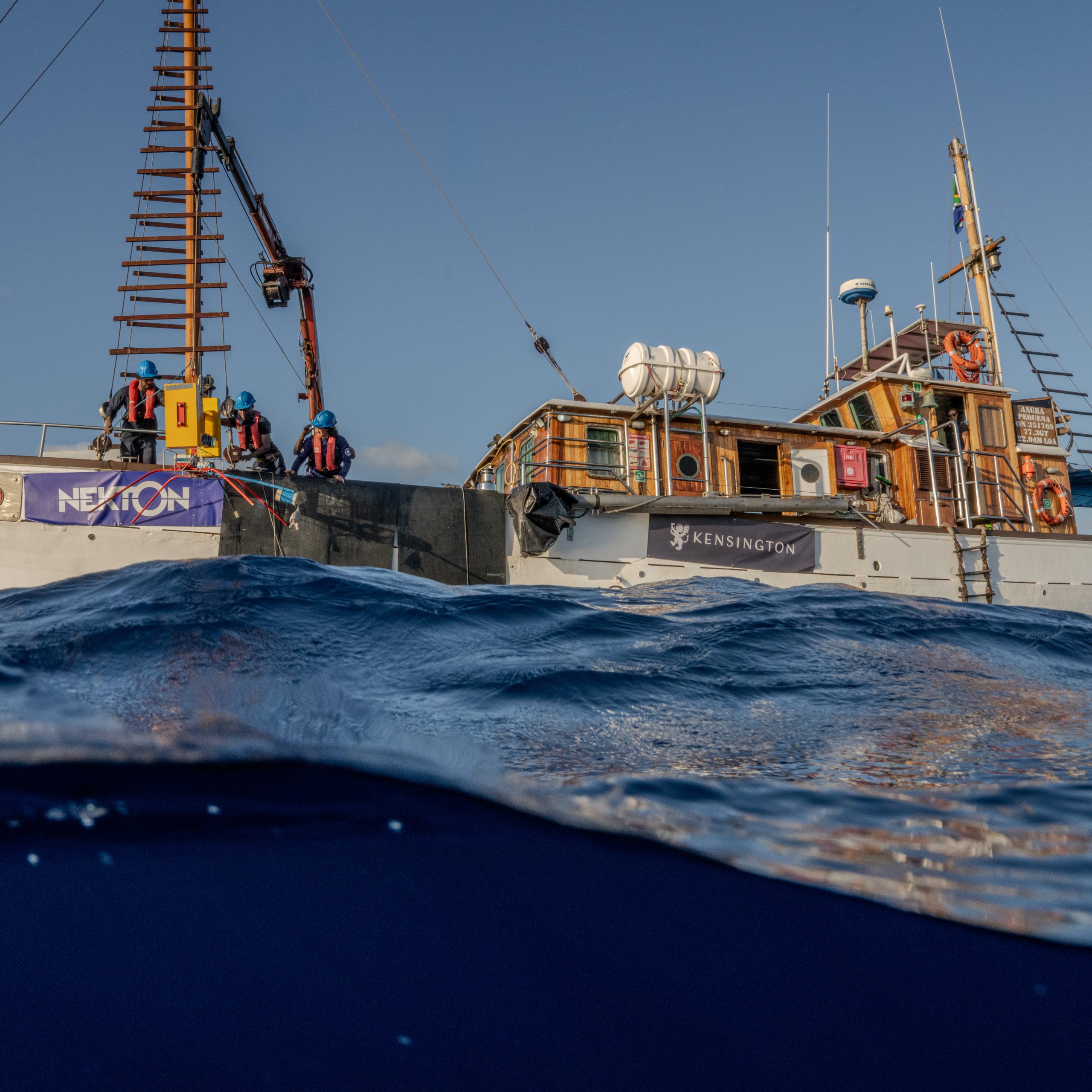

This ocean mission across one of the world’s most biodiverse, and least explored regions, includes the development of a pioneering Comorian-led study of the ancient coelacanth (“Gombessa”), a 410-million-year-old species central to the nation’s identity and conservation story.
Moroni, Union of the Comoros – October 2025. The Government of the Comoros and Nekton are partnering with WILDTRUST under the R-POC programme (Renforcement de la Protection des Océans aux Comores – Strengthening Ocean Protection in Comoros) to launch the nation’s first systematic exploration of its ocean, from the surface to 900 metres. The waters surrounding the Comoros Islands, at the heart of the Mozambique Channel, are among the most biodiverse yet least studied regions of the global ocean.
“The ocean is the birthplace of our nation and the cornerstone of our civilisation on the shores of this beloved archipelago. This mission reflects the growing awareness of the decisive and essential role the ocean plays in addressing the biodiversity and climate crises. Faced with these challenges, we must continue to mobilise and place the sea at the centre of our attention, taking decisive steps to protect it. Through this partnership between the Government of the Comoros, Nekton, and WILDOCEANS, we are deepening our understanding of our marine ecosystems so that we can safeguard 30% of our land and seas by 2030 — for the well-being of our communities today and for generations to come.” — H.E Abubakar Ben Mahmoud: Minister of Environment, in charge of Tourism.
At the centre of the mission are Comorian scientists and community voices. Mission Co-Chief Scientist Dr Nadjim Ahmed Mohamed of the University of Comoros, supported by 17 Comorian researchers, alongside Nekton and mission partners, will lead efforts to document unexplored habitats such as mesophotic reefs and deepwater ecosystems, while also developing a Comorian-led research programme into the legendary coelacanth, a 410-million-year-old “living fossil” locally known as Gombessa.
The waters surrounding the Comoros Islands are among the most biodiverse yet least studied regions of the global ocean

As President Azali Assoumani told the United Nations General Assembly: “In the Indian Ocean, the Comoros faces a different frontline.” The First Descent: Comoros expedition supports his Emerging Comoros Plan, advancing national leadership in ocean science, sustainable development, and the blue economy.
Concluding on the eve of COP30 in Brazil, the First Descent: Comoros mission will directly support the country’s bold commitment to protect 30% of its waters by 2030, safeguard livelihoods, and expand knowledge of its unique biodiversity. For Comoros—a small island nation at the front line of the climate crisis—ocean protection is both urgent and existential.
Operating under the R-POC programme (Renforcement de la Protection des Océans aux Comores – Strengthening Ocean Protection in Comoros), the mission brings together Comorian and international scientists, conservationists, and communications specialists. R-POC is a national initiative led by the Government of Comoros with partners including the General Directorate of Environment and Forest, the University of Comoros, CNDRS(National Center for Documentation and Scientific Research), the Comoros Parks Agency, CORDIO East Africa, and WILDTRUST (WILDOCEANS programme). Findings from the expedition will underpin new and expanded Marine Protected Areas and help shape national strategies for ocean protection and a sustainable blue economy.
The expedition will run from 6 October – 6 November 2025 aboard the R/V Angra Pequena, a 22-metre research vessel operated by Comoros Mission Partner WILDTRUST. It will deploy technologies including the remotely operated vehicle (ROV) , Baited Remote Underwater Stereo-Video (stereo-BRUV) landers , and a high resolution multi-beam echo-sounder, all provided by Mission Partner, the NRF-South African Institute for Aquatic Biodiversity) NRF-SAIAB. All data and samples will remain vested with the Government of the Comoros.
The First Descent: Comoros mission will directly support the country’s bold commitment to protect 30% of its waters by 2030

International support for First Descent: Comoros is led by Nekton’s founding partner Kensington, together with the Nippon Foundation–Nekton Ocean Census, the NRF-South African Institute for Aquatic Biodiversity (NRF-SAIAB), and the University of Exeter. These partners bring scientific, technical, and communications expertise to help ensure discoveries directly support the Comoros’ 30×30 commitment and wider regional ocean protection goals.
The coelacanth, or Gombessa, is one of Earth’s rarest species; a 410-million-year-old “living fossil” The coelacanth was discovered off the coast of South Africa in the 1938, and in 1952, a second coelacanth was found in the Comoros. The Eblimatic Gombessa is both a symbol of biodiversity and national pride—even the Comoros football team bears its name.
For Comoros, the sea is a lifeline and heritage, yet anthropogenic influences have left its ecosystems under strain. With R-POC and its partners, the government is determined to change course. First Descent: Comoros will deliver the science, stories, and international recognition needed to achieve 30×30 and spotlight the role of small island nations in leading global ocean protection.
The mission is co-designed and co-led with Comorian scientists and institutions under the R-POC framework. Comorian researchers will be central to analysis and publications, ensuring discoveries benefit Comoros directly and leave a lasting scientific legacy.

Mission Newsroom
Video and photographic content, news releases, and background materials will be available pre-, during, and post-expedition through the First Descent: Comoros newsroom, hosted via the Associated Press. https://apmultimedianewsroom.com/nekton
Assets will also be made freely available to the media via Nekton Directly.
{PRESS KIT AVAILABLE HERE}
The press kit includes: Assets (Images).
Interviews
Comorian scientists, government representatives, and Nekton’s international team will be available for interviews before and during the expedition, including live interviews from the research vessel R/V Angra Pequena.
Contact
International Media: Kira Coley, Head of Communications, Nekton, [email protected]; Jack Hogan, Communications Manager, Nekton
[email protected] / +44 7 444 66 8184
CNDRS: Mze Hamadou Toiwilou [email protected]
University of Comoros: Soule Hamidou [email protected]
R-POC: Houssoyni Housseni Programme Manager [email protected]
Comoros Media: Seaview Worldcom/ Ali Ahmed Mahamoud [email protected]
Nekton is an independent, not-for-profit research institute and UK registered charity. Nekton works to accelerate the scientific exploration and conservation of the ocean through expeditions, applied research, storytelling, and knowledge exchange. The Comoros mission is part of Nekton’s First Descent programme, with Past missions in Seychelles and the Maldives forming an ongoing series of Indian Ocean expeditions launched in partnership with regional governments and scientists.
Coastal Oceans Research and Development in the Indian Ocean (CORDIO), East Africa is a non-governmental organisation working at the intersection of marine scientific research and conservation policy and practice in the western Indian Ocean (WIO). CORDIO’s work ranges from promoting sustainable resource use within fishing communities to national and regional policy development to improve governance of marine ecosystems.
WILDTRUST (WILDOCEANS programme)
WILDTRUST is a South African based Non-Profit, Non-Government and Public Welfare Organisation, established in 2004 and pursues the realisation of its vision of “A Thriving and Resilient World” through two core programmes: WILDLANDS and WILDOCEANS.
As a programme of the WILDTRUST, the WILDOCEANS programme champions inclusive, locally rooted solutions that conserve & restore ocean species and ecosystems, strengthen governance, and create lasting, tangible benefits for coastal communities who depend on the ocean for their livelihoods. At the same time, we catalyse and contribute to national, regional, and global action, at scale
Through strong science, strategic partnerships, and inclusive community development, WILDOCEANS delivers locally led, globally significant impact – advancing the 30×30 ocean conservation goal and broader climate action efforts, while building resilient systems for and with future generations.
NRF-South African Institute for Aquatic Biodiversity
The South African Institute for Aquatic Biodiversity (NRF-SAIAB) is a national facility of the National Research Foundation (NRF). NRF-SAIAB contributes to two national Operation Phakisa Labs, which aim to unlock South Africa’s potential in the Biodiversity Economy and the Blue Economy. With core funding from the South African Department of Science, Technology and Innovation and the NRF, the Institute has developed advanced research platforms capable of operating across diverse aquatic environments. These platforms have positioned NRF-SAIAB as an innovative leader in aquatic biodiversity research. Through its research, student supervision, and platform provision, NRF-SAIAB supports the higher education sector by educating, training, and developing the aquatic researchers and managers of the future.
Kensington is the leader in private guided luxury travel, offering bespoke journeys in over 120 countries. Its portfolio spans Kensington Tours, Cruises, Villas, Air, and sister company Kensington Yachts, a dedicated yacht brokerage which blends land and sea experiences. Its newest addition, Kensington Expeditions, takes luxury and adventure to new heights with immersive itineraries across land, sea, air, and even space.
